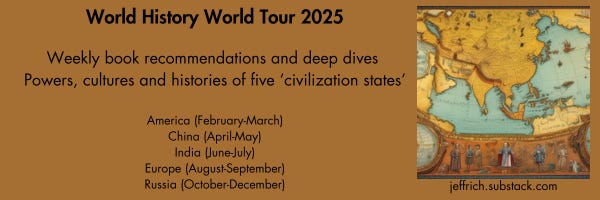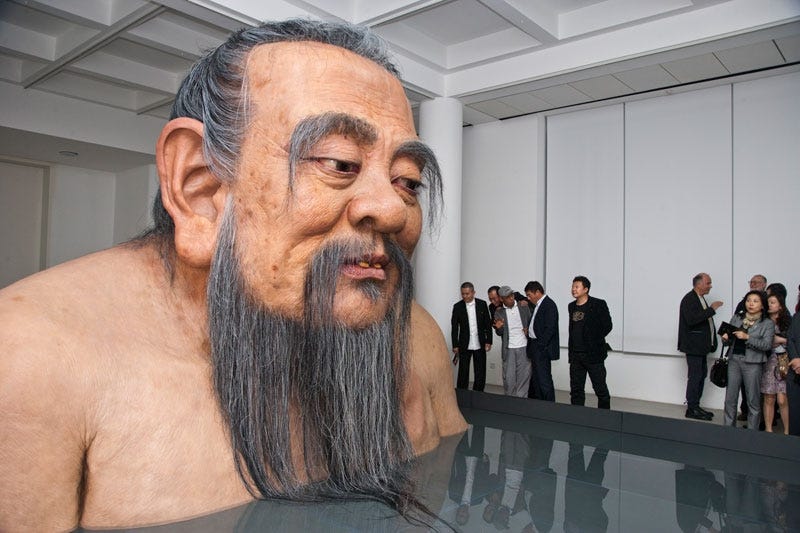An Introduction to Confucius
including reading from Pierre Ryckmans' classic essay on Confucius
Last week’s history book recommendation, Linda Jaivin The Shortest History of China provided a snapshot of the thinker who is most associated with the Chinese civilization-state, Confucius.
(Note the voiceover this week includes this post and a mini audiobook reading from the classic essay by Simon Leys (Pierre Ryckmans), “An Introduction to Confucius.”)
Confucius, or Kongzi (‘Master Kong’), was born in 551 BCE. He idealised education and the junzi, the educated or cultivated man, as the best guide to social harmony. He wandered China preaching philosophies for wise rule, but no rulers wanted him. Instead, his followers assembled his teachings into posthumous writings, including the aphorisms in The Analects, considered one of the foundational texts of Chinese civilization.
Jaivin commented that the meaning of these texts has been debated for millenia. Such is life for foundational texts. In my deep dive this week (How Modern China began in Qing Institutions: Part One of a Deep Dive into Klaus Mühlhahn, Making China Modern), I shared how those texts were debated by Neo-Confucians and other schools during the Tang, Ming and Qing dynasties, including during the “Chinese Enlightenment.”
The meaning of Confucius may be disputed, but the influence of the ideas gathered under his name is not. Jaivin quotes the scholar Pierre Ryckmans on that civilizational influence:
“No book in the entire history of the world has exerted, over a longer period of time, a greater influence on a larger number of people than this slim little volume.”
Pierre Ryckmans ‘Foreword’ in Confucius, The Analects (1973)
Ryckmans’ translation of The Analects has become a modern classic. His ‘Foreword’ to the translation has become a classic historical essay on Confucius. For that reason I have chosen this essay as my classic essay mini audiobook on the China leg of the world tour.
Ryckmans’ essay has become a classic because he was both an idiosyncratic thinker and an exemplary essayist. His essays were gathered into a collection, The Halls of Uselessness: Collected Essays (2012). The collected essays are gathered like a Borgesian scholarly list into these parts: Quixotism; Literature; China; The Sea; University; and Marginalia. He belongs to my small canon of undefinable writers who cross genres and belong to no schools of thought.
Before I read to you his classic essay, “An Introduction to Confucius,” let me introduce this legend of Sinology1.
When he died in 2014 there were obituaries across the Australian media. He was an “inspirational teacher with a legendary mastery of Chinese and a passionate love of traditional Chinese art and literature.”
But he was also a literary intellectual and great essayist. A jealous American academic once described him as “a Western avatar of the former ruling class of Chinese men of letters whose aesthetic ideals he obviously shared”. Ryckmans embraced the insult.
He taught at ANU until 1994, so for a few years we trod the same grounds, but we did not meet. More significantly, he supervised the honours thesis of former Prime Minister of Australia (and current Australian Ambassador to the USA), Kevin Rudd. Unfortunately, Ryckmans’ grace did not transmit to Rudd.
By the time Ryckmans retired as an academic, the modern university experience had disappointed his gentleman-scholar ideals. The university had become, he said:
a bazaar where a thousand wares are spread haphazardly, while the scholars themselves are turned into pedlars, touts and pimps, desperately competing to hustle for a few more suckers.
If we put aside the bitter sneer at suckers, Ryckmans was inspired by an ideal of the life of the mind. He sought to navigate the mysteries of truth “irrespective of the consequences, implications and utility of this endeavour”.
He articulated this ideal in his essay “An Introduction to Confucius.” The essay presents a more mysterious version of Master Kong than many Chinese and Western accounts. I am no Sinologist and cannot claim Ryckmans presents the most authoritative view. But it is one of the most beautifully written. It is a step up from most accounts of Chinese civilization available in popular media, especially in relation to world politics and the US struggle to prevail as hegemon over “autocratic” China.
A common stereotyped version of Confucian ideas is that they are the source of Chinese authoritarianism, at home and abroad, for good or ill. In the field of international relations, mostly defined by USA scholars, a distorted image of Confucian ideas has prevailed. These Western ideas of Asian world order assume that China wants to be the Confucian, authoritarian master of the world.
This distorted view was doctrinally expressed in Samuel Huntington, The Clash of Civilizations and the Remaking of World Order (1996, 2nd edition 2011). He presented a model of Sinic civilization that preferred a hierarchical model of society, both domestic and international, symbolised by the tribute system and the Middle Kingdom. Huntington used this concept to undercut arguments for a multipolar world, even back in 1994. He wrote that, because of their Confucian bias to authoritarianism, “the Chinese have not been sympathetic to ‘multipolar or even multilateral concepts of security’.”
China may profess harmony, diplomacy, peace, and shared development; but they have not learned the hard lessons of Greater European wars.
“The Confucian ideal of world order was, of course, never fully realized in practice. Nonetheless, the Asian hierarchy of power model of international politics contrasts dramatically with the European balance of power model.”
Huntington, The Clash of Civilizations (pp. 234-235)
By means of Confucius, pro-American international relations scholars have revived the old trope of “Asiatic despotism” to justify America’s partition of Eurasia, or as they would say the liberal rules-based world order. This week’s deep dive into Mühlhan, Making China Modern explores the real ideas of Asian world order professed during the Qing dynasty in more detail.
Ryckmans offers a more complex portrait. He reads Confucius as a complex, literary thinker formed through a collective tradition. He does not fit this rounded peg into the square hole of geopolitical analysis. He avoids the dull tropes of international relations. He finds the more vital source of Master Kong’s imagination. By listening to this version of Confucianism, you can reimagine China’s role in world history.
Ryckmans begins his essay with Lu Xun (1881-1936), the modernist master of Chinese literature, loved by all sides, to whom I will return to later in the China World History Tour.
Listen on for my reading of the main sections of “An Introduction to Confucius” from Simon Leys (Pierre Ryckmans), The Halls of Uselessness.”
The reading is included in the voiceover - if you have been reading text so far. You can skip directly to the classic essay at timestamp 11:30.
Thanks for reading and listening
Jeff
PS. Ryckmans essay also refers to an essay on Confucius by Elias Canetti, Nobel Prize in Literature. You can read my profiles of all 121 of these greats of world literature at my Nobel Archive by becoming a paid subscriber.
There is a biography of Ryckmans by Philippe Paquet, Simon Leys: Navigator Between Worlds Navigator between worlds, and it is reviewed here





